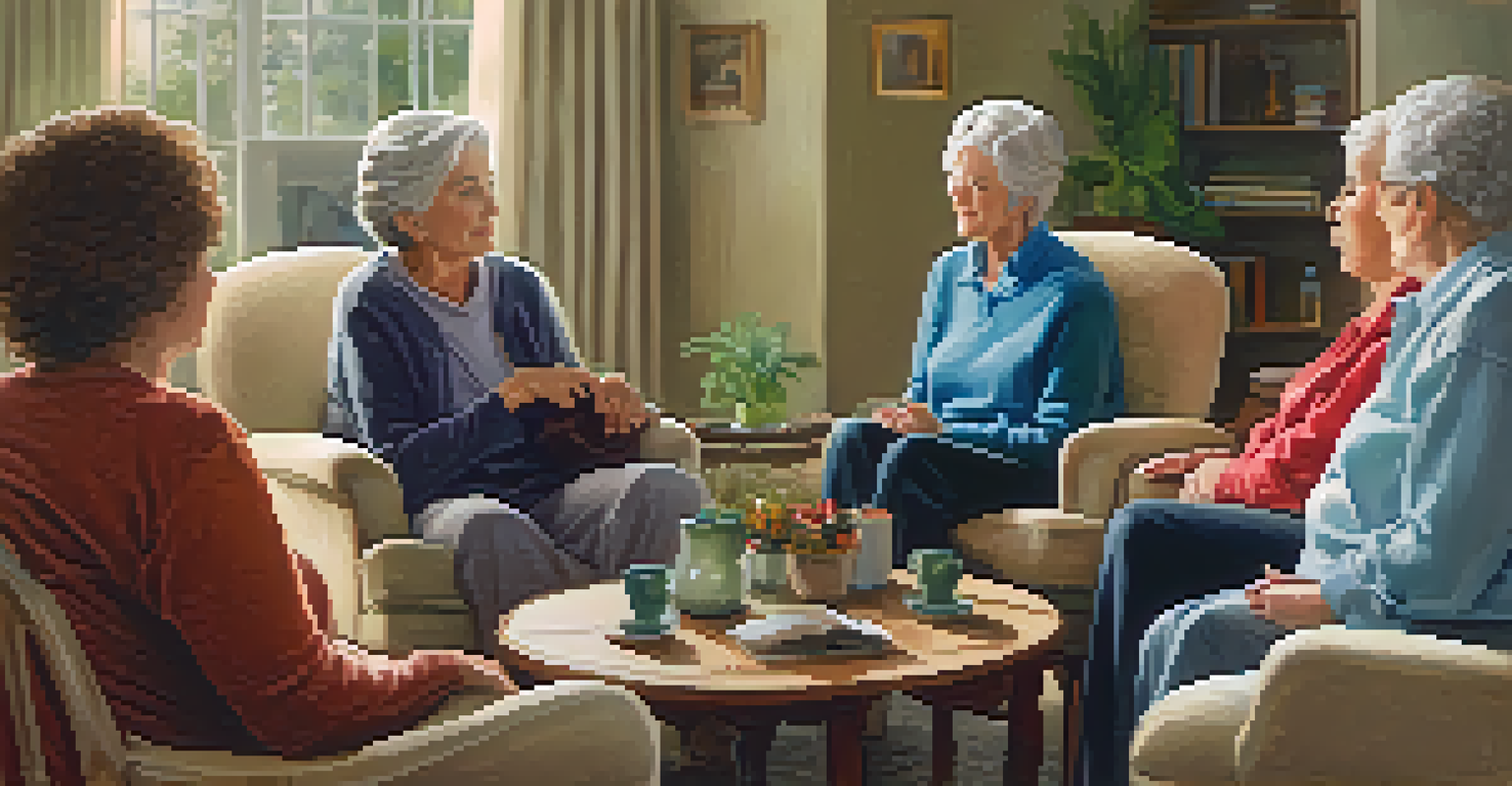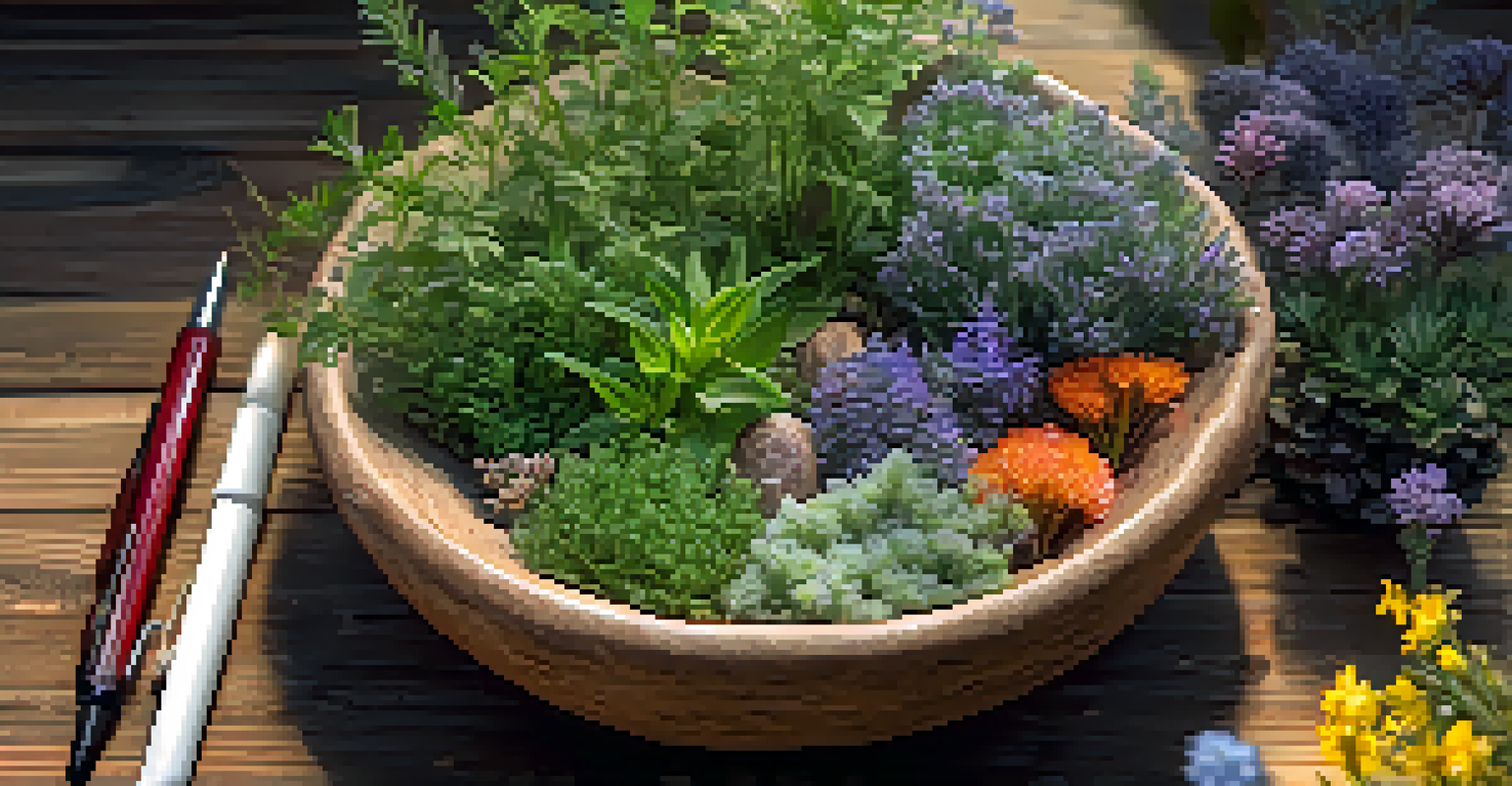The Potential of Entheogens for Elderly Well-Being

Understanding Entheogens and Their Effects
Entheogens are substances, often derived from plants, that are used to alter consciousness and enhance spiritual experiences. They have been utilized in various cultures for centuries, often in rituals or therapeutic settings. For the elderly, these substances may offer new avenues for mental health and emotional well-being, tapping into deeper parts of the psyche.
Entheogens can help individuals reconnect with their inner selves.
With aging often comes challenges such as loneliness, depression, and cognitive decline. Entheogens might provide a unique way to address these issues by promoting introspection and emotional healing. The therapeutic potential of these substances extends beyond mere recreation, as they can help individuals reconnect with their inner selves.
Research is beginning to reveal how entheogens can positively impact mental health, particularly in older adults. By fostering a sense of connection and enhancing emotional resilience, these substances could play a pivotal role in improving quality of life for seniors.
The Science Behind Entheogens and Aging
Scientific studies are increasingly exploring the effects of entheogens on brain function and emotional health. For instance, substances like psilocybin have shown promise in treating depression and anxiety, conditions that disproportionately affect older adults. This research is vital for understanding how these substances can be safely integrated into therapeutic practices for the elderly.

One key area of focus is neurogenesis, the process of creating new neurons in the brain. Some studies suggest that certain entheogens may stimulate this process, potentially counteracting cognitive decline associated with aging. This means that not only could entheogens enhance mood, but they might also contribute to improved cognitive function in seniors.
Entheogens Enhance Emotional Healing
Entheogens can help older adults confront unresolved emotions, promoting introspection and emotional resilience.
Additionally, research indicates that entheogens can promote neuroplasticity, which is the brain's ability to reorganize itself by forming new connections. This adaptability could be particularly beneficial for elderly individuals facing memory loss or other cognitive challenges.
Therapeutic Uses of Entheogens in Elderly Care
In therapeutic settings, entheogens may offer a valuable tool for mental health professionals working with older adults. By facilitating guided experiences, therapists can help seniors explore their emotions and confront unresolved issues. This process can lead to breakthroughs in understanding and acceptance, which are critical for emotional well-being.
The future may hold exciting possibilities, from innovative therapies to supportive community programs that utilize these substances responsibly.
For example, some facilities are integrating entheogen-assisted therapy into their programs, allowing seniors to engage in meaningful dialogue about their life experiences. This not only enhances emotional healing but also fosters a sense of community among participants. The shared experience can help combat feelings of isolation, which are common among the elderly.
Moreover, the use of entheogens in a controlled and supportive environment can significantly reduce anxiety associated with aging. By promoting relaxation and a sense of peace, these substances can improve overall well-being and allow seniors to face life's challenges with a renewed perspective.
Cultural Perspectives on Entheogens and Aging
Throughout history, various cultures have utilized entheogens in ways that honor their spiritual and communal significance. For many indigenous cultures, these substances are seen as sacred tools for healing and wisdom. Understanding these cultural contexts can provide valuable insights into how entheogens might be used responsibly with elderly populations today.
Incorporating traditional practices into modern therapeutic settings can enhance the effectiveness of entheogen use. By respecting the cultural significance of these substances, practitioners can create a more holistic approach to elderly care. This might include rituals or community gatherings that promote connection and support among seniors.
Research Supports Cognitive Benefits
Studies suggest that entheogens may stimulate neurogenesis and neuroplasticity, potentially improving cognitive function in seniors.
Additionally, recognizing the diverse cultural attitudes towards aging and spirituality can help tailor entheogen therapy to individual needs. Different backgrounds may influence how seniors perceive and engage with entheogens, making cultural competency essential in these therapeutic practices.
Potential Risks and Considerations
While the potential benefits of entheogens are promising, it's crucial to acknowledge the risks involved, especially for the elderly. The effects of these substances can vary widely based on individual health conditions, medications, and psychological states. Therefore, thorough screening and professional guidance are essential before any entheogen use.
Older adults may have unique vulnerabilities, such as a higher likelihood of experiencing adverse psychological effects. It's important for caregivers and healthcare providers to be aware of these risks and to monitor seniors closely during any entheogen-assisted experiences. Establishing a safe environment is key to minimizing potential harm.
Informed consent and education play significant roles in the responsible use of entheogens. Seniors should be fully aware of what to expect and the potential risks involved, ensuring they feel comfortable and supported throughout the process. This not only empowers them but also fosters a sense of agency in their own healing journey.
Personal Stories: Elders Finding Healing with Entheogens
Personal anecdotes can offer powerful insights into the impact of entheogens on elderly well-being. Many seniors report transformative experiences that have allowed them to confront their past, enhance their emotional resilience, and foster deeper connections with loved ones. These stories highlight the potential of entheogens as catalysts for healing and growth.
For instance, one elderly participant in a guided entheogen therapy session shared how the experience helped her process grief after losing her partner. She described feeling a profound sense of connection with him during the session, leading her to find peace and acceptance. Such narratives underscore the emotional depth that entheogens can facilitate.
Cultural Contexts Matter in Therapy
Incorporating traditional practices and understanding cultural attitudes can enhance the effectiveness and safety of entheogen therapy for the elderly.
These personal stories not only inspire hope but also illustrate the diverse ways in which entheogens can benefit the elderly. As more seniors share their experiences, it becomes increasingly evident that these substances hold the potential to enrich lives and enhance overall well-being.
Looking Ahead: Future of Entheogens in Elderly Care
As research on entheogens continues to grow, so does the potential for their integration into elderly care. The future may hold exciting possibilities, from innovative therapies to supportive community programs that utilize these substances responsibly. This evolution could revolutionize how we approach mental health and well-being for seniors.
Collaboration between researchers, healthcare providers, and policymakers will be essential in shaping a framework for safe and effective entheogen use among the elderly. This could involve establishing guidelines, training programs, and support networks to ensure that the benefits are maximized while risks are minimized.

Ultimately, the integration of entheogens into elderly care could pave the way for a more compassionate and holistic approach to aging. By acknowledging the potential of these substances, we can empower seniors to explore new dimensions of well-being and connection in their later years.